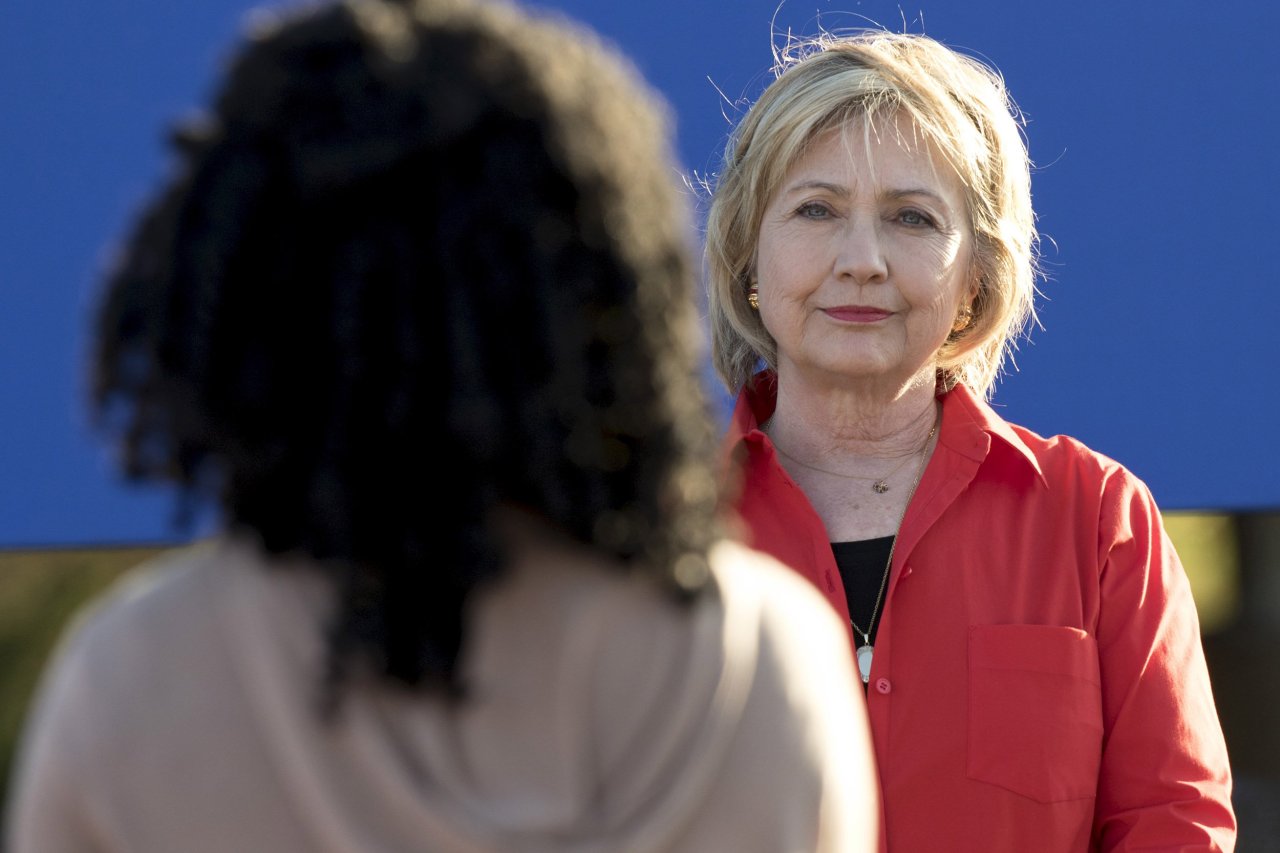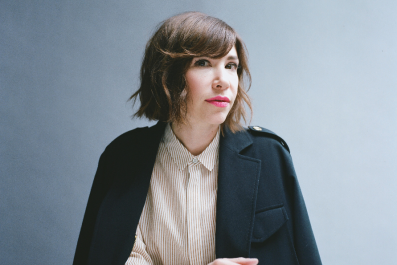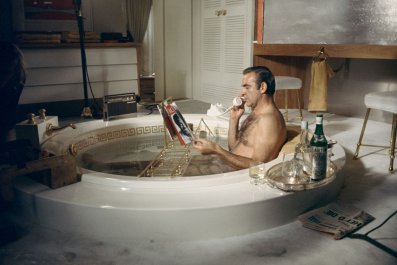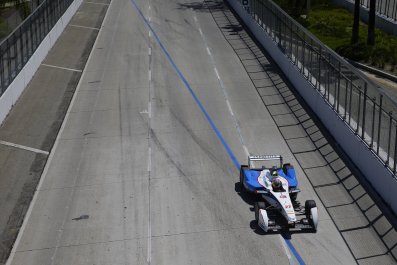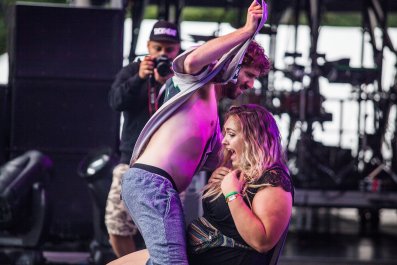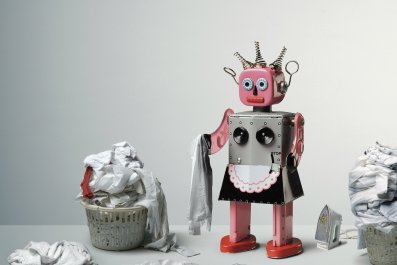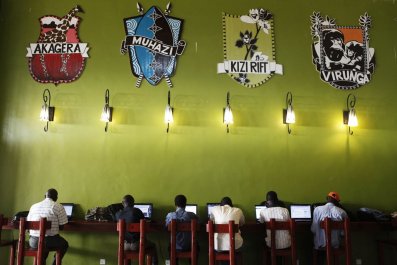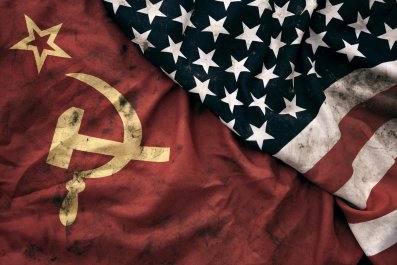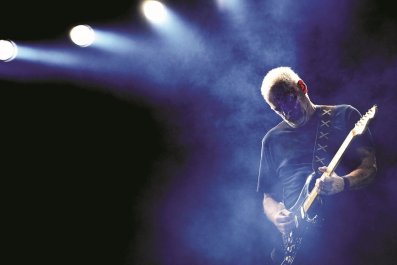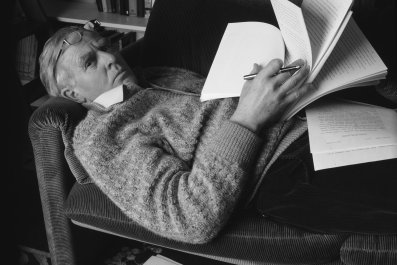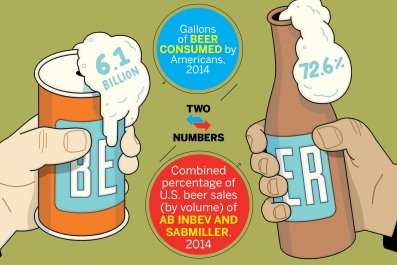Since she formally announced her candidacy on June 13, Hillary Clinton has missed few chances to mention her gender. "I may not be the youngest candidate in this race," the 68-year-old said, to cheers and laughter at the New York City event. "But I will be the youngest woman president in the history of the United States."
As a presidential candidate, Clinton is playing the gender card like no one ever before. Besides promising to address women's issues if elected, the former secretary of state has built her campaign on the fact that she's a woman. She cites her late mother's life story as an abandoned teen who worked as a maid and her own status as a grandmother in nearly every speech, and she regularly hits feminist issues of equal pay and women's reproductive rights. In late October, before the third GOP debate, her campaign released four ads targeting working women's economic concerns.
The emphasis on gender is in stark contrast to her 2008 presidential bid, when Barack Obama defeated her for the Democratic presidential nomination. Back then, advisers steered her away from playing up her gender. They crafted an image of "manly" strength—although her eyes welling up during the New Hampshire primary as she discussed the plight of working families was widely credited with giving her the win in that first primary.
This time, she doesn't have to compete against Obama, another transformative candidate, although one could argue that by making socialism less of an epithet in the U.S., Senator Bernie Sanders can also claim he's a history-making candidate.
Clinton is currently surging with core support from women and is savvy to emphasize women's issues and her Wellesley-to-the-White-House tale. She has a huge lead among women, and if she's sworn in on January 20, 2017, it will be owing to their votes. But there are trouble spots. She's always been a polarizing figure, a proverbial lightning rod for male and female hopes and fears about women's role in American society. Now, offering women the chance to see history made, she confronts women who love her, women who loathe her and a muddy middle where the attitude can be summed up as: ehh, maybe.
Related: Can Hillary Clinton Move Beyond Benghazi
Female support for Clinton heading into the Democratic primaries has been strong but unsteady. Her midsummer peak among Democratic women nationally was a whopping 71 percent, which fell to 42 percent in September. She recovered and by mid-October was at 61 percent, according to ABC News–Washington Post polls.
The irony is that the women who most resemble Clinton—white, older, married and moneyed—are less excited about her than millennials (adults 18 to 34 this year), women of color and unmarried women of all ages. Those differences will be critical in the general election.
Pollsters and strategists have a number of theories about why younger women are more enthusiastic about Clinton than her graying peers. One reason has to do with memory. Millennials "have known her as senator and secretary of state and presidential candidate," says Celinda Lake, a Democratic pollster who specializes in women voters. "They have only known her when she comes into her own."
Related: Hillary Clinton, First Lady: The 1993 Newsweek Cover Story
Baby boomer women, born between 1945 and 1964, are more volatile in their estimation of Clinton, Lake finds. They remember too much of her baggage, such as her husband's infidelity and the scandals of the Clinton White House. For women her age and slightly younger, the unease is a female subset of Clinton Fatigue. She is a living reminder of the humiliating fact that not long ago a working woman in the White House—wearing pants, no less—was considered revolutionary. "There is more ambivalence about the marriage, which millennials don't even focus on. [Boomers] are critical on everything from 'Should she have stayed with him?' to what she did with her emails [as secretary of state]," says Lake, adding that voters "are always more nitpicky" about candidates in their cohort.
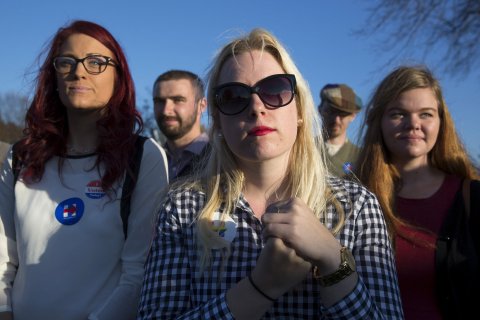
Younger women, on the other hand, are more likely to see Clinton as transformational, akin to the way Obama was hailed as the apostle of hope and change in 2008, when he attracted significant young female support. Sanders also draws youth, but Clinton's potential to be the first female president carves into his appeal. "Sanders, for younger women, is still an older white man," says Democratic pollster Anna Greenberg.
Younger women may be more comfortable than older women with Clinton because they came of age in a more equal era. Justin Barasky, spokesman for Priorities USA, the largest super PAC supporting Clinton, notes that younger women "have grown up in a society where ESPN runs women's World Cup soccer and everybody watches. I don't think they have the same skepticism about her, if it exists, as people who experienced their teen years in the '50s, '60s and '70s." Priorities USA recently ran Spanish-language ads aimed at engaging women in Nevada and Colorado. One of them, "Mi Hija (My Daughter)," describes a young mother's hopes for her girl.
Young female support is crucial for Clinton because millennials outnumber boomer women when it comes to 2016 voting eligibility, says Marcy Stech, spokeswoman for Emily's List, a pro-choice, Democratic PAC that has ponied up $20 million for a "Madam President" project to help Clinton get elected. "This surge in younger voters is a huge shift for Democrats," Stech says. "The people we need to win elections are becoming younger and more diverse."
Clinton's female supporters are also more likely to be unmarried, and she does especially well with those under 55 who either never married or divorced. They are more likely to be moved by Clinton's progressive economics in general and her support for equal pay in particular. They are a critical demographic for any candidate because in 2016 they will for the first time outnumber married women—a majority of whom vote Republican.
Researcher Margie Omero is part of a bipartisan team tracking "Wal-Mart moms," defined as women with a child living at home under age 18 who have shopped at Wal-Mart in the past month. In early November, the researchers met with two groups of 10 Wal-Mart moms—Democrats in Iowa and Republicans in New Hampshire. The Iowa Democratic women, four of whom were Sanders supporters, were not "engaged" by Clinton, one observer said, and the majority of them didn't feel especially supportive of her just because she is a woman.
Lake says Clinton's greatest general election challenge will be winning over older, married, independent women. In talking about her mother and her role as a grandmother, Clinton can make inroads with this group because she sends not just a gendered message but "a value-oriented conversation" about work, struggle and perseverance.
Clinton's staunchest supporters are African-American women. They do not think first of scandal and infidelity when they hear the name Clinton, says Lake. "They remember better days under the Clintons. They thought the economy was better then, and they like strong, independent women." Black women are also as a group more Democratic than white women.
By contrast, Clinton draws the support of only 26 percent of white men, according to a Wall Street Journal –NBC poll.
Some of Clinton's close friends and advisers say the gender strategy, whether successful or not, is more genuine than the 2008 strategy that tried to present her as resolute, tough and disciplined without emphasizing her interest in the welfare of women and children. "Hillary is fond of saying she is the least-known famous person in America," says longtime political strategist Paul Begala, a veteran of Clinton campaigns going back to 1992.
Clinton's passion for women's issues is both authentic and a lure for younger women, says Debbie Walsh, director of Rutgers's Center for American Women in Politics. "It did her no good to run away from the reality of who she is," Walsh says of the 2008 campaign. "In some ways, by not talking about that directly, [the Clinton campaign] didn't let young women get how historic it would be for a woman to be elected president."
If the numbers are any indication, young women get it now. It remains to be seen whether Wal-Mart moms will too.



